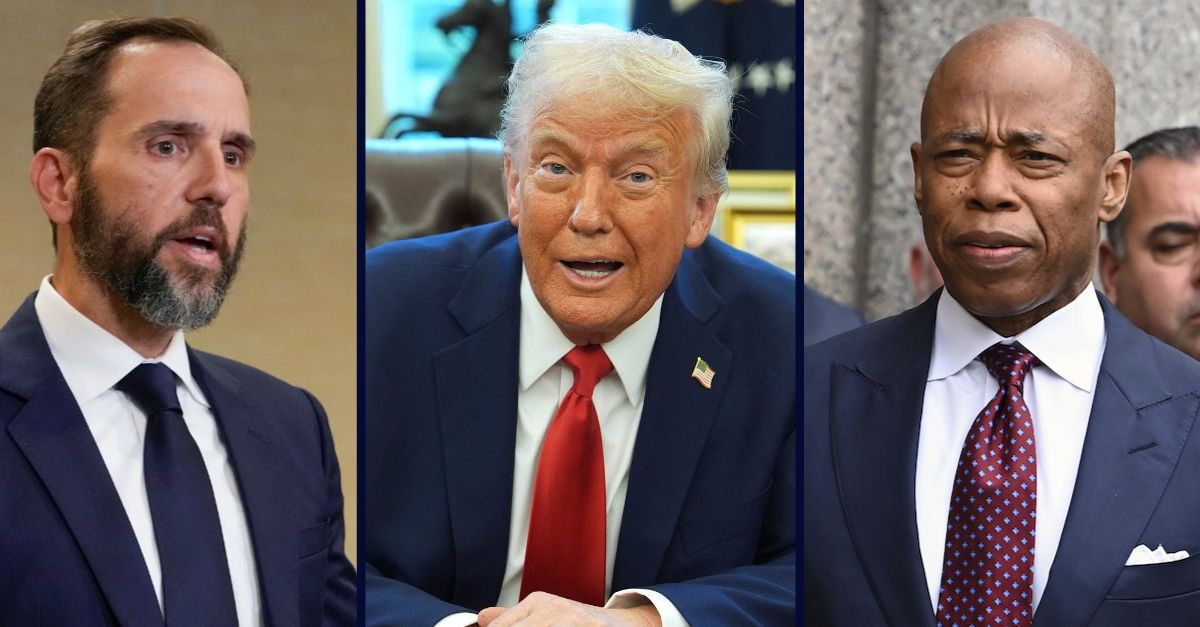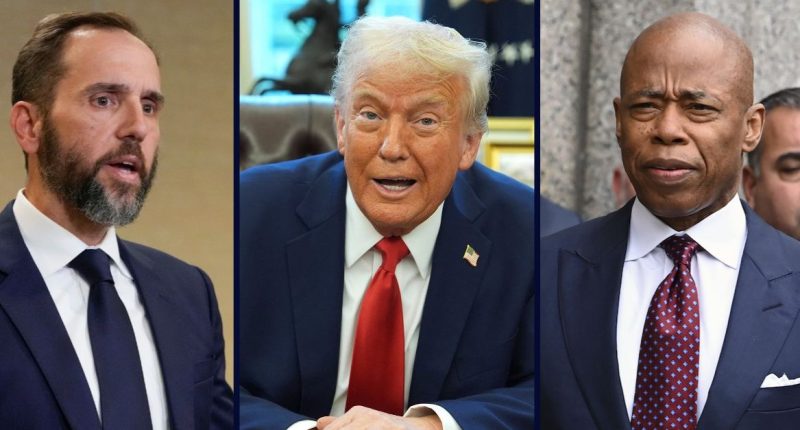
Left: Special counsel Jack Smith speaks about an indictment of former President Donald Trump, Aug. 1, 2023 (AP Photo/Jacquelyn Martin, File). Center: President Donald Trump speaks after signing an executive order in the Oval Office of the White House, Monday, Feb. 3, 2025, in Washington (AP Photo/Evan Vucci). Right: Mayor of New York City Eric Adams leaves federal court on September 27, 2024 in Lower Manhattan, New York City after pleading not guilty to corruption charges of bribery and wire fraud in connection with alleged illegal contributions he received during his 2021 mayoral campaign (zz/Andrea Renault/STAR MAX/IPx).
Eric Adams, the mayor of New York, faces a five-count federal indictment for public corruption in the Southern U.S. District of New York — but Emil Bove, the acting Attorney General for Department of Justice, has ordered lawyers in the Southern District to dismiss the federal criminal case against him.
Any new administration has the power to dismiss criminal charges brought by a previous administration. While, historically, this discretion has often been exercised by the DOJ attorneys in the various local districts, Bove sent a clear message that he and DOJ headquarters — colloquially called Main Justice — are in charge of the DOJ.
However, Bove’s convoluted reasoning for the dismissal actually jeopardizes the dismissal of the charges. Bove’s reasons may also open the door for other criminal defendants to seek dismissal of their charges. Finally, Bove appears to be sending a message to former special counsel Jack Smith that the DOJ thinks his efforts were motivated by politics and there will be serious consequences for that.
The case against Adams is typical of the cases brought in the Southern District for political corruption. In essence, DOJ charged that Adams, when he was the Brooklyn borough president and as mayor, accepted bribes for certain actions he took. DOJ alleged that he received gifts in the form of first-class airline travel and swanky hotel stays and meals, and, in return, Adams used his political power to speed up the city approvals process for the Turkish consulate.
Bove’s reasoning to drop the charges against Adams is convoluted and does not stand up to the light of day. In his memo, filed Feb. 10, Bove gives multiple reasons, but he affirmed his decision to drop the charges was made “without assessing the strength of the evidence.” Bove mentions the timing of the original charges against Adams and notes that Adams had criticized President Joe Biden’s immigration policies. Bove also points out that Damian Williams, the Biden-appointed U.S. Attorney for the Southern District, spoke out against Adams after he left his government position.
Further, Bove mentions in his memo that the charges interfere with Adams’ reelection campaign, echoing Trump’s own claims that Biden’s DOJ went after him because he was Biden’s opponent. Bove laments in his letter to Danielle Sassoon — the former Acting U.S. Attorney for the Southern District who resigned in a harshly-worded letter highly critical of the move to drop the Adams charges — that the DOJ prosecution has “restricted Mayor Adams ability to devote full attention and resources to the illegal immigration.”
Bove’s letter tells the country that if Adams helps the Trump administration with illegal immigration, the federal criminal charges will be dismissed. Prosecutors have tremendous leverage over defendants, but it has to be used wisely. For example, defendants’ sentences can be reduced if they give evidence against other bad guys. However, criminal defendants must not be given favoritism because they help the incumbent government officials with their jobs. Bove’s directive opens the door for other defendants to demand that their charges be dismissed for reasons not connected to the merits of their cases.
Aside from its wisdom, Bove’s decision will face legal hurdles as well. Under the Federal Rule of Criminal Procedure, the DOJ is not the sole decision-maker when it comes to dropping charges: the judge has to agree as well. The U.S. Supreme Court, in a 1977 case called Rinaldi v. United States, said that dismissal of charges may be denied if the decision was “prompted by considerations clearly contrary to the public interest.” U.S. District Judge Dale Ho, a Biden appointee, may not be receptive to Bove’s reasoning and, at a minimum, has signaled that he will not be a rubber stamp for dismissal of the charges: on Friday, he appointed a former solicitor general as a “friend of the court” in order to have an “adversarial” process to determine how the matter should proceed.
The U.S. Attorney’s office in the Southern District of New York has been known as the “sovereign state” because it has generally operated independently of Main Justice. Its lawyers have incredible legal credentials. For example, Sassoon — the former head of the office who resigned over the directive to drop the charges against Adams — was a law clerk for the late conservative Justice Antonin Scalia, and Hagan Scotten, who was a prosecutor in the Adams case, was a law clerk for Chief Justice John Roberts.
Despite these credentials, however, and despite knowing these Southern District lawyers might refuse to follow his order, Bove instructed them to dismiss the charges. Bove and the DOJ sent a clear message to the Southern District office — and the country — that all of DOJ’s decision-making authority will be in the nation’s capital and not in the field offices. In other words, criminal prosecution decisions will be made in Washington, D.C.
Bove’s reasoning in the Adams case also focuses on how DOJ has interfered with Adams’ duties as mayor and in his reelection campaign. Bove, who represented Trump in his criminal case, and Attorney General Pam Bondi are clearly preparing to unload on Smith. The DOJ’s so-called Weaponization Working Group is highly likely to find that Smith prosecuted Trump for political reasons. At a minimum, the group will conclude that Smith violated DOJ guidelines and norms. But they will be looking to take the investigation to a much more serious and higher level and will look for ways to recommend that Smith and some of his team be criminally prosecuted. After all, in the Adams case, Bove has apparently targeted the Adams’ prosecutors’ actions for investigation.
Bove’s showdown with the prosecutors in the Southern District will have long-term ripple effects beyond the fate of Adams. First, DOJ is sending a message to all federal prosecutors that all power in the Trump DOJ will be based at Main Justice. If you are a DOJ attorney and do not follow an order, you are likely to be dismissed. Also, Bove’s convoluted reasoning opens the door for other criminal defendants to argue that their charges should be dismissed based upon improper politically motivated actions by prosecutors. Finally, Bove and DOJ are sending a message to former special counsel Smith and his team that the DOJ will be coming after them.
John P. Fishwick, Jr. is the founder and owner of Fishwick & Associates PLC, a trial law firm in Roanoke, Virginia. John previously served as the United States Attorney for the Western District of Virginia.
This is an opinion piece. The views expressed in this article are those of just the author.








